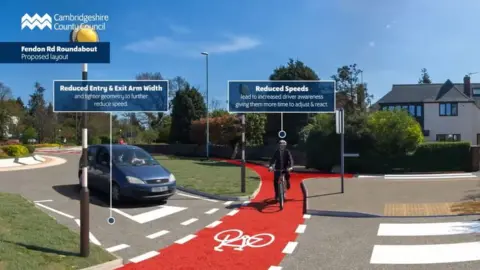Cambridge's Dutch roundabout 'recklessly pushed ahead with'
 Cambridgeshire County Council
Cambridgeshire County CouncilA council building the UK's first Dutch-style roundabout has been accused of "recklessly pushing ahead" with the project as costs nearly treble.
The cost of the roundabout on Fendon Road, Cambridge - which gives priority to cyclists and pedestrians - has risen from an estimated £800,000 to £2.3m.
Council officials blamed the rise on "unexpected utility work" and Covid-19.
Edward Leigh, from Smarter Cambridge Transport, said the council pushed ahead before detailed survey work.
The new roundabout is being installed at the junction of Queen Edith's Way, one of the main access routes to Addenbrooke's Hospital.
Excavations began on the project in September, and work has yet to be completed, having been expected to finish by April.
 Cambridgeshire County Council
Cambridgeshire County CouncilIt had originally been estimated to cost £800,000 but a report to be seen by Cambridgeshire County Council's Highways and Transport Committee next week said before construction began this had risen to about £1.5m.
The report said that soon after work began "substantial additional utility work, including BT and UK Power Network cabling" were discovered.
The committee's chairman, councillor Ian Bates, said: "Before the scheme started there was already a lot of work identified by utility companies, but there is often a risk that further diversions are needed after work starts.
"That coupled with Covid-19 has impacted the overall programme and this now needs to be fully understood."
But Mr Leigh said the county council had "recklessly pushed ahead with a scheme before completing detailed survey work".
He added: "It is now very doubtful whether this scheme represents better value for money than other cycling schemes the money could have been spent on.
"Some of those schemes are losing funding to pay for this one."

What is a Dutch-style roundabout?
 Cambridgeshire County Council
Cambridgeshire County CouncilThe "Dutch-style" design gives priority to cyclists and pedestrians with an inner ring for cars and an outer one for cyclists. The design is prolific in The Netherlands, which is renowned for its investment in cycling infrastructure.
The idea is to "influence slower approach and departure speeds", thereby reducing the speed of drivers.
There are zebra crossings for pedestrians on each of the four roundabout arms.
Cyclists have their own outer ring cycle path - in contrasting red tarmac - to give them equal priority with pedestrians over each arm.
